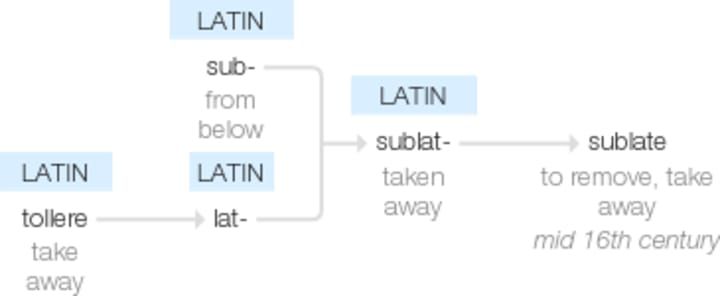The Oxford English dictionary defines sublation as - 'assimilate (a smaller entity) into a larger one.' The example of its use in a sentence provided is "fragmented aspects of the self the subject is unable to sublate".Here, I think it is important to point out the common Anglo-Saxon conflation of sublation and subsumption.
Before we get into that however, let us examine the etymology of the word for this is where the most common objection to the hypothesis posited will come from.

I bring this to your notice because of the use of the word in the English language has also served to translate 'Aufhebung' - a concept Hegel deploys in the Phenomenology for instance to depict a certain dialectical moment.
Here, I admit that it is indeed possible to translate a word in various ways - yet there is within the English language a tendency to stick to a brute empiricism which often forgets the fact of its own conceptual mediation, the fact that no language is entirely self-generating, that naming is an instance which creates the possibility of bracketing predicates - and as certain as the predicates may be, such as hardness, extensionality or color, the name itself is arbitrary. I say this partly in reference to the English empiricist philosophers, Berkley, Locke and Hume, who, while nuanced thinkers, are often encapsulated in text book form into an elucidation of the above caricature.
So how would 'subsume' differ from 'sublate'? Well subsume would refer to the act of including or representing, yet it also has the connotation of the taking over of the function. Marx for instance would argue that the labour of workers in a factory is subsumed by the organisation of that institution, that their efforts serve a function whose only meaningful service can be thought within the totality of the commodity being produced in the factory - like a car for instance.
To sublate however, is not entirely the same. I may argue with my mother for instance regarding wanting to buy a new pair of glasses. In being refused, I may face disappointment - and yet this will, hopefully make me consider the situation which permitted such a development, the fact that I required money - such a means of reasoning, while a departure from Hegel's idealism, is perhaps a simplistic illustration of sublation, which thinks the circumstances of a negation, ie - the specificity of the situation which led to the denial, or cancellation of a certain effort, this retroactively forcing a subject to consider the negative of this point, but not merely as a memory, but inference - one which tries to name that which was (or is demanded) by the situation, which was not present.
The Slovenian philosopher, Slavoj Zizek - along with the Ljubljana School of Psychoanalysis, have, along similar lines, offered us a conjunctionary reading of Hegel and Lacan. Infact, the depiction of the absence in the situation represented above has a name in Lacanese - the object petite a, which is used almost as an algebraic term in Lacanian Psychoanalysis to represent the object cause of desire - that whose lack prompted the subject to attempt to articulate it, or reach for it, even if only as a symptom, or, perhaps - a fantasy.
There is a lesson here that he has for us. For in the understanding of our lack, if we can appreciate the fact that we as mortal and finite beings are fundamentally lacking, that we require food, water and air just to survive - and that in our strivings we have, together put together, bit by bit, over time, a society which is capable of addressing these - we may be able, to enjoy our lack. This I believe is the fundamentally radical Zizekian insight.
And, in many ways - can we not see, in stories, from fairy tales to rags to riches stories - a utopian wish fulfillment which has been operating, indeed, driving the narration of tales, between friends, parents and child, on magazines and forums on the internet? One of the questions which psychoanalysis asks is who is this representation directed to - ie. who is the subject supposed to know? Who can understand the determinations, the specificity of a story, its historicity, and from within such a representation, glean an effort, even if only a drive, centered on nothing but its own abolition, a symptom such as hunger or thirst - and provide it with the metaphorical glass of water that will quench it.
Of course, most of the iceberg is usually hidden underwater, and very few of us these days, in the times of social distancing, go around wearing our heart on our sleeve. Trusting, even a friend or family member with concerns, wishes, thwarted aspirations is not easy, and often what is offered is a statement on the veracity of such a desire rather than an understanding of its form.
Strangers in a society, have so much that they do not share that it is often the place of the media, entertainment, politicians, perhaps religion, which gives them a story they can believe in, which allows them to identify themselves as being called in an appeal, as being part of a narrative. It is easy to buy into a narrative, yet examining competing narratives is important and requires care and unbiasedness. It cannot simply be a matter of opinion - if for instance I leave the car key on my table at home and ask my mother to bring it for me and she says that it isn't on the table, ask my father about it, and he tells me that he put it there - then I know one of two things, either one of them is not right, or both the stories are incomplete in some way. This would be a simple inference, yet dreams and desires are often far more complicated - and the ways in which we seek them, more so.
I may write a poem for instance to impress a girl I have a crush on, not knowing that she may not care for poetry. She may even tell me that she likes it, so as to maintain a polite distance, a suspicion which would be exacerbated were that to be the last thing I hear from her.
In a sense, the work of a psychoanalyst does offer a privilege, which is perhaps unique - it provides a purvey into the way our common everyday desires take on forms of expression, articulations, gestures, impasses which are entirely singular. And yet, in these singularities - commonalities may be found, and this is, basically how a practice begins.
The unconscious is structured like a language. This was one of Lacan's lessons and I believe that something that would hold us in good stead, in any practice would be to bear in mind how the words we use, our representation of a problem, our framing of a question, may indeed be incorrect - or, as Zizek would put it, part of the problem itself. This is not to say that there are no stupid questions, a phrase you may have heard your school teacher say - there are. The point is that they do not end there, they provide you, if nothing else, an example to examine why they did not take you any further. Or perhaps to why the answer which revealed itself was unsatisfactory. And, in this, we may perhaps learn how to ask better questions, which to me is the principle task of education.
